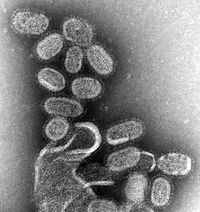
Photo from wikipedia
Reverse vaccinology (RV) is a computer-aided approach for vaccine development that identifies a subset of pathogen proteins as protective antigens (PAgs) or potential vaccine candidates. Machine learning (ML)-based RV is… Click to show full abstract
Reverse vaccinology (RV) is a computer-aided approach for vaccine development that identifies a subset of pathogen proteins as protective antigens (PAgs) or potential vaccine candidates. Machine learning (ML)-based RV is promising, but requires a dataset of PAgs (positives) and non-protective protein sequences (negatives). This study aimed to create an ML dataset, VPAgs-Dataset4ML, to predict viral PAgs based on PAgs obtained from Protegen. We performed seven steps to identify PAgs from the Protegen website and non-protective protein sequences from Universal Protein Resource (UniProt). The seven steps included downloading viral PAgs from Protegen, performing quality checks on PAgs using the standard BLASTp identity check ≤30% via MMseqs2, and computational steps running on Google Colaboratory and the Ubuntu terminal to retrieve and perform quality checks (similar to the PAgs) on non-protective protein sequences as negatives from UniProt. VPAgs-Dataset4ML contains 2,145 viral protein sequences, with 210 PAgs in positive.fasta and 1,935 non-protective protein sequences in negative.fasta. This dataset can be used to train ML models to predict antigens for various viral pathogens with the aim of developing effective vaccines.
Journal Title: Data
Year Published: 2023
Link to full text (if available)
Share on Social Media: Sign Up to like & get
recommendations!